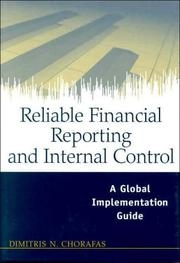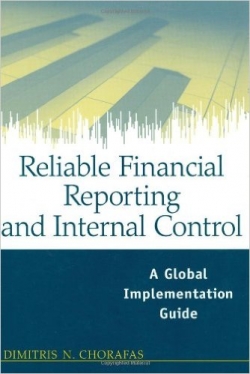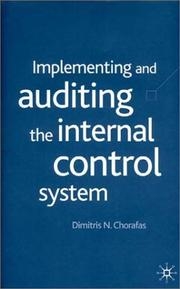Reliable Financial Reporting and Internal Control: A Global Implementation Guide

Buy online ($)
Type
Book
Authors
Dimitris N. Chorafas ( . )
ISBN 10
0471382612
Category
Publication Year
2000
Publisher
Volume
1
Pages
268
Tags
Description
The present is conditioned by the future, not by the past. . . .
Never before in history has it been possible to look as far into the futureas it is today, and with as much confidence about events to come. (from Reliable Financial Reporting and Internal Control).
Reliable financial reporting as well as efficiency and effectiveness in operations are not simply regulatory issues. They are also the best lens through which companies can look into the future, helping top management identify inadequate procedures before it is too late. In addition to damage control, they help senior management foresee what they should be planning. And a sound plan of action is now more important than ever as the U.S. percentage of the global investment pie continues to grow, along with the advent of the final recommendations of the Basle Committee on Banking Supervision.
Increased opportunity, however, brings with it increased exposure?and therefore a greater need for high- quality internal control. This is especially critical in the UnitedStates, which has the most stringent financial reporting requirements in the world. Yet the lack of a fully functioning global accounting system in an era of complex derivative markets may pose a threat to the current prosperity. Clearly, traditional approaches to accountability and controls are less and less relevant to risk management in an expanding globalized economy?as are their definitions. Crucial to reducing risk is an understanding of the dynamic between three critical issues examined here: internal control and international accounting standards; reliable financial reporting as defined by COSO; and The New Capital Adequacy Framework by the Basle Committee on Banking Supervision.
Equally important, this book explores the lingering questions surrounding what exactly is meant by internal control, including:
•Is internal control part of risk management, or vice versa?
•Or, are these two activities independent of one another?
•Is internal control part of auditing? If not, whose job is it?
Along with operations issues there also exists the human factor.Countless poor management decisions have stemmed from a reluctance to take decisive action. The sharpened foresight gained by effective, efficient, progressive operations, as discussed here, will leave management better prepared to take such action, ultimately reducing risk?and ensuring continued prosperity for the future.
Never before in history has it been possible to look as far into the futureas it is today, and with as much confidence about events to come. (from Reliable Financial Reporting and Internal Control).
Reliable financial reporting as well as efficiency and effectiveness in operations are not simply regulatory issues. They are also the best lens through which companies can look into the future, helping top management identify inadequate procedures before it is too late. In addition to damage control, they help senior management foresee what they should be planning. And a sound plan of action is now more important than ever as the U.S. percentage of the global investment pie continues to grow, along with the advent of the final recommendations of the Basle Committee on Banking Supervision.
Increased opportunity, however, brings with it increased exposure?and therefore a greater need for high- quality internal control. This is especially critical in the UnitedStates, which has the most stringent financial reporting requirements in the world. Yet the lack of a fully functioning global accounting system in an era of complex derivative markets may pose a threat to the current prosperity. Clearly, traditional approaches to accountability and controls are less and less relevant to risk management in an expanding globalized economy?as are their definitions. Crucial to reducing risk is an understanding of the dynamic between three critical issues examined here: internal control and international accounting standards; reliable financial reporting as defined by COSO; and The New Capital Adequacy Framework by the Basle Committee on Banking Supervision.
Equally important, this book explores the lingering questions surrounding what exactly is meant by internal control, including:
•Is internal control part of risk management, or vice versa?
•Or, are these two activities independent of one another?
•Is internal control part of auditing? If not, whose job is it?
Along with operations issues there also exists the human factor.Countless poor management decisions have stemmed from a reluctance to take decisive action. The sharpened foresight gained by effective, efficient, progressive operations, as discussed here, will leave management better prepared to take such action, ultimately reducing risk?and ensuring continued prosperity for the future.
Number of Copies
1
| Library | Accession No | Call No | Copy No | Edition | Location | Availability |
|---|---|---|---|---|---|---|
| Main | 23 | 1 | Yes |



